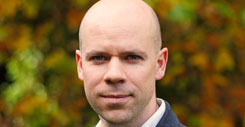
14 September 2018 – Eliot Whittington, Director, Corporate Leaders Group reflects on the three main outcomes required from the Global Climate Action Summit to put the world on track towards a zero carbon future
If global plans for climate action were a football tournament, then the current game has reached half-time and are in urgent need of a team talk to regroup.
We are at the midway point between the momentous Paris Agreement of 2016 and the 2020 milestone for its implementation
So this week’s [Sept12-14] Global Climate Action Summit, organised to “take ambition to the next level” provided an ideal opportunity to consider our climate goals and how to deliver them.
For a growing number of business leaders that are trying to execute the climate game plan, setting clear and unequivocal targets that push the boundaries of innovation will be essential to achieve a zero carbon economy. This is the message brought forward by the Corporate Leaders Group, a progressive trade association of CEOs from a range of industries that I convene
This insight requires three main outcomes from San Francisco. Firstly, the bold commitment to reduce our actual carbon emissions to as close as possible to zero by 2050.
CEOs from companies such as EDF, Signify and Unilever have say that to deliver on the Paris Agreement, they are operating on the basis of a world that needs to peak emissions by 2020 and see an exponential decline thereafter.
And they also explain that the stretching targets they have introduced as a response actually unlock and inspire ever-more creative ways to run their businesses – opening up new efficiencies and business opportunities.
Carpet tile manufacturer Interface has demonstrated how successful this approach can be after setting a goal of zero emissions back in 1996. That audacious but forward-looking target inspired a shift to renewable energy and greater energy efficiency, resulting in a 96 per cent fall in the intensity of greenhouse gas emissions at manufacturing sites
If governments sent a clear signal that zero emissions by 2050 was the destination this could galvanise business action across the board – motivating more companies to dedicate time and resources to achieving a net zero future. Those leading businesses who are already following this path would find it easier to engage with shareholders and partners in their value chain, speeding up the pace of innovation & change.
Secondly, companies must accept that it will not be enough to simply decarbonise what they currently do: they will need to completely rethink it.
Members of the Corporate Leaders Group tell us they no longer think of their businesses in terms of individual products but in terms of interconnected systems
The rise of the circular economy offers growing opportunities to be more resourceful and efficient. Our research suggests that companies can use this approach to rethink how they do business. For example Signify (formerly Philips Lighting) is increasingly moving from providing lighting products to providing lighting services, while EDF have supported initiatives that document building materials to encourage their reuse and recycling, helping homeowners track and plan home renovations to improve energy efficiency.
Finally, we should recognise that the transition to a zero carbon economy must also be fair.
Addressing climate change is an opportunity to identify and invest in new skills that will not only achieve the necessary transformation but will create new jobs at the same time
New technologies will be key in bringing about this transition but they should be harnessed in a way that addresses social and economic inequality, rather than exacerbating it.
Fighting climate change is the challenge of our generation and will require continued and relentless efforts from all sections of society.
The first step in unlocking these efforts is to give a long-term signal from the top that a zero carbon economy by 2050 is not only a global priority but is entirely possible.
Then, we must help more companies get out onto the field and get ahead before the final whistle.





